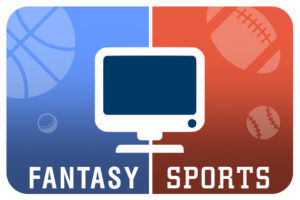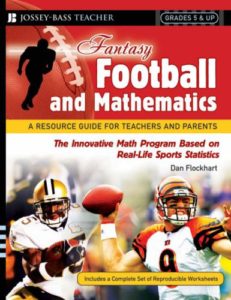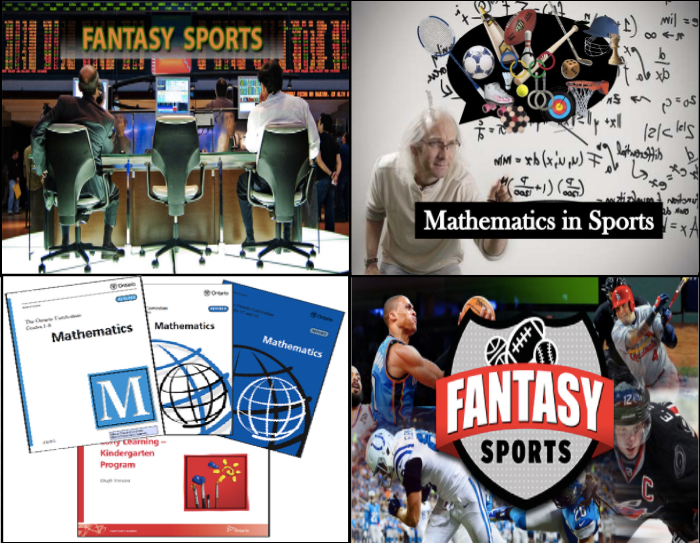How Fantasy Sports Can Enhance Math Class
Within the modern day math class there is a large push to integrate strands, incorporate authentic tasks or Project Based Learning (PBL), and utilize technology among a vast array of proven pedagogical frameworks. Teachers may scramble to seek reputable resources and become anxious regarding how to execute these things effectively. I say look no further than fantasy sports.
Why not create an environment where the math classroom meets both the cognitive and social emotional needs of it’s students? This student centred approach requires students to predict, analyze, collaborate, and reflect while transferring more agency to the learner. This “gamified” approach allows students to be the creators of content rather than consumers. It ensures higher order thinking practices above procedural skills. Having students come in each day excited to learn and share with one another is pivotal in terms of 21st century learning. Learning in this way makes math interactive and constantly evolving. It’s authentic and meaningful and students will be able to witness the real world application first hand. Students become drivers of their own learning along with acting as policy/decision makers.

Fantasy Sports in Math
What It Teaches
- Justification of process
- Comparing and contrasting relationships among data sets
- Effective decision making skills
- Analytical analysis
- Inferencing
- Predictive modelling
- Integrated subject disciplines
- Critical reasoning
- Collaboration skills
Take Learning Beyond the Text
Finding a stand alone resource to achieve this desired outcome will be difficult (putting it mildly). In fact, most textbooks are often broken down by strand and focus on a pre-determined procedure. Gravemeijer (2016) argued that “although the textbooks (and curriculum guidelines) attend to conceptual understanding, they stop prematurely in the conceptual development process.” Gravemeijer adds that while this is no one’s fault students often do not reach the desired mathematical proficiency. Fantasy sports create a learning environment which fosters a “designed thinking” process in order to achieve a desired outcome.

Fantasy Football and Math
Examples of Math
- Numeracy: computations & arithmetic (fractions, decimals, place value, etc)
- Patterns: both predictive and previous models
- Graphing/Data Management: utilize a wide variety of graphs to interpret data in a meaningful way, organizing and presenting data
- Probability: likelihood of events along with comparison between experimental and theoretical probability
- Number Talks: explain math strategy and reasoning
- Technology Integration: variety of software applications to interpret and display data
- Thinking/Reasoning: aligning data and making sound inferences based upon information
This doesn’t account for the fact that this is fun and engaging! Students will be excited to track something happening live and in real time. They track data which is constantly changing and evolving. In my experience learners have enjoyed tasks where they collaborate which in turn has resulted in less math anxiety and interesting a natural affinity for mathematics.
Students can make trades, draft any players they wish, and decide on their starting lineups each week…. They control their teams, and they enjoy the feeling of power that comes with managing a franchise. This independence helps them to build their decision-making skills, thus contributing to their social and cognitive development. (Rowe 2014)
One additional benefit is that for those students who enjoy this type of learning and would like to continue with it into the future there are a plethora of opportunities available. A 2015 CNC article places this career pathway as a top ten in terms of job satisfaction (O’Brien 2015). This could be due to the autonomous nature of the field.
Finally, fantasy sports offer a medium for classroom teachers to achieve a desired outcome in a unique way. Consider trying an approach that may have students pounding on the door to get into math class, you just may change someone’s future!
References
Delisio, Ellen. “Fantasy Game Helps Students ‘Pass’ Math.” Education World: Fantasy Football Game Builds Math Skills, Education World, www.educationworld.com/a_issues/chat/chat162.shtml.
Dishman, Lydia. “Why Coding Is Still The Most Important Job Skill Of The Future.” Fast Company, Fast Company, 14 June 2016, www.fastcompany.com/3060883/why-coding-is-the-job-skill-of-the-future-for-everyone.
Gravemeijer, K., Bruin-Muurling, G., Kraemer, J.-M., & van Stiphout, I. (2016). Shortcomings of mathematics education reform in The Netherlands: A paradigm case? Mathematical Thinking and Learning, 18(1), 25–44. doi:10.1080/10986065.2016.1107821
O’Brien, Sarah, and special to CNBC.com. “10 Profitable Reasons to Major in Math or Science.” CNBC, CNBC, 16 June 2015, www.cnbc.com/2015/06/15/math-science-skills-add-up-to-more-job-opportunities-survey.html.
Rowe Claudia Rowe, Claudia. “Fantasy Football in the Classroom Can Reap Real-Life Gains in Math.” The Seattle Times, The Seattle Times Company, 5 Sept. 2014, blogs.seattletimes.com/educationlab/2014/09/05/fantasy-football-math/.

